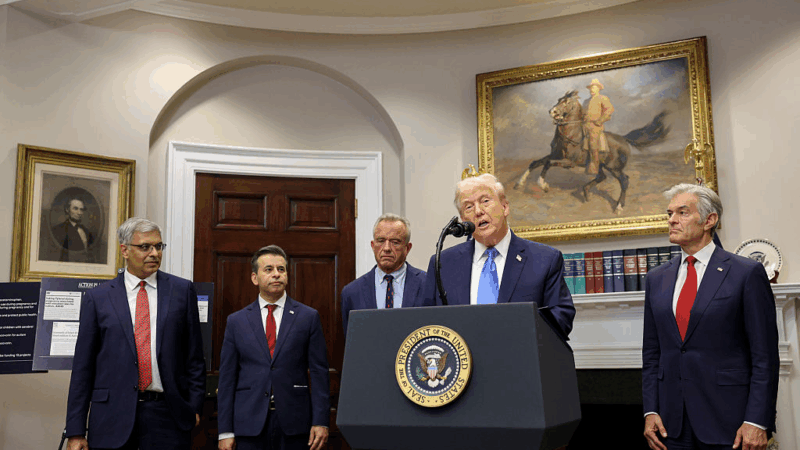Lawsuits against Tylenol’s maker get a boost after Trump’s comments
President Trump’s announcement last week linking Tylenol with autism could play a role in ongoing legal cases against the company that makes it.
One lawyer representing patients who say they were harmed by the drug says his firm has gotten an influx of more than a thousand calls this week from potential new clients asking for information.
“A lot of inbound calls have come in, as you would expect now that a very bright spotlight has been put on this issue,” says attorney Ashley Keller, whose firm Keller Postman is representing people in a product liability lawsuit against the drugmaker Kenvue.
The Trump administration’s attention to the issue has also given the firm new ammunition in its appeal of the lawsuit, though the courts had effectively shot it down almost two years ago.
The president, flanked by federal health officials, declared that acetaminophen, the generic name for Tylenol, “can be associated with a very increased risk of autism.”
During the press conference, officials said the Food and Drug Administration would begin the process of updating the safety label for Tylenol and acetaminophen.
“So taking Tylenol is not good,” the president told reporters. “All right. I’ll say it. It’s not good.” He went on to suggest that pregnant women could “tough it out” if they have a fever and said there was “no downside” to not taking the pain medication.
A later press release from the FDA was more measured and noted that although some studies found an “association” between the painkiller and autism, they had not established whether the painkiller in fact caused autism. The press release also said that acetaminophen is the only safe over-the-counter pain medication for pregnant women to take for fever, which can be harmful for a developing fetus.
Keller says he filed what was among the first lawsuits alleging that prenatal acetaminophen exposure caused autism or ADHD. But in 2023, a judge ruled to exclude testimony from the experts he and his colleagues had gathered to help make their case. Judge Denise Cote of the Southern District of New York wrote that the experts “cherry picked” and misinterpreted the data they were relying on.
“I think the judge’s other concern was that… the expert testimony was to claim that there was a causation, whereas the research itself never claims causation,” says Sonia Suter, a professor who teaches law and medicine at the George Washington University School of Law and was not involved in the case. “So there was an inconsistency between the testimony for purposes of being an expert witness and exactly what the findings of the study showed.”
But since the Trump administration cited one of those experts, Dr. Andrea Baccarelli, in their announcement this week, Keller and his team are filing a new letter with the court to support their ongoing appeal.
“One thing that I think is significant is that his scientific analysis was considered reliable enough for our nation’s executive branch officials to credit,” Keller says of Baccarelli. “And that’s a pretty good sign that his scientific expertise was reliably applied. And so that could be a relevant consideration for the Court of Appeals.”
The Harvard T.H. Chan School of Public Health, where Baccarelli is the dean, said he isn’t available for interviews.
Oral arguments in the appeal begin on Oct. 6, Keller says.
However, legal experts aren’t so sure the administration’s announcement will make much difference to a judge because there’s no new data.
“I don’t think it means that they have a better chance,” says Dr. Aaron Kesselheim, a professor of medicine at Brigham and Women’s Hospital and Harvard Medical School, where he created the Program on Regulation, Therapeutics and Law. “Nothing fundamentally has changed about the research. The science is the same today as it was last week and before all this nonsense.”
Product liability cases are tough to prove, he says. Ultimately, lawyers will have to prove causation, which hasn’t yet been established.
Still, that doesn’t mean it won’t cause a big headache for Tylenol’s manufacturer, Kenvue, which spun off from Johnson & Johnson in 2023.
“I think there’s something very dangerous about the president using his power to make statements that are not supported in the science,” says Suter. “I think that is very dangerous for public health generally.”
As for Kenvue, it issued a statement saying it disagrees with any suggestion that taking acetaminophen causes autism, because decades of scientific research show that it is safe. The statement went on to note that “high fevers and pain are widely recognized as potential risks to a pregnancy if left untreated.”
This quiet epic is the top-grossing Japanese live action film of all time
The Oscar-nominated Kokuho tells a compelling story about friendship, the weight of history and the torturous road to becoming a star in Japan's Kabuki theater.
The Live Nation trial could reshape the music industry. Here’s what you need to know
On Tuesday opening statements will begin for the federal antitrust trial against Live Nation, one of the largest entertainment companies in the world.
A new one-a-day-pill holds promise for HIV’s ‘forgotten population’
It's designed to take the place of complicated, multiple drug regimens that many people with HIV need to follow. And it's also beneficial because the HIV virus is always evolving.
For filmmaker Chloé Zhao, creative life was never linear
Director Chloé Zhao used meditation, somatic exercises and dance to inspire the cast and crew of this Oscar-nominated story about William Shakespeare's family.
10 new books in March offer mental vacations
March is always a big one for books – this year is no different. We call out a handful of upcoming titles for readers to put on their radars — offering a good alternative to doomscrolling.
Sen. Chris Coons, D-Del., talks about the war with Iran and upcoming war powers vote
NPR's A Martínez asks Delaware Democrat Chris Coons, a member of the Senate Foreign Affairs Committee, about the war with Iran.







